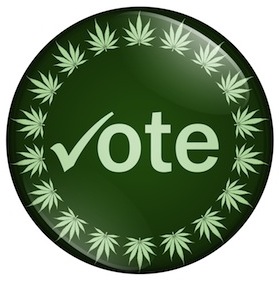Also see: California Measures Taxing Medical Marijuana Win Big At Ballot Box AP, 11/5/14
 November 5, 2014 – California voters at the local level continue to favor taxing marijuana, but aren’t sure the want to see it grown, or sold.
November 5, 2014 – California voters at the local level continue to favor taxing marijuana, but aren’t sure the want to see it grown, or sold.
On a night when Washington DC, Oregon and Alaska voted for adult legalization measures, and 57% of Florida voters approved medical marijuana (falling short of the 60% needed in that state), Californians voted by 58.5% to approve Proposition 47, a measure to defelonize drug possession. Proposition 46, which was pushed as a measure to drug test doctors and was therefore opposed by California NORML, lost handily with 67% of the voters rejecting it.
Two of the three measures in Riverside county to tax medical marijuana sales and cultivation appear to have passed. Cathedral City voted to enact a 15% sales tax on medical marijuana; in Desert Hot Springs voters approved a 10% tax on sales, plus a tax on medical marijuana cultivation of $25 per square foot for the first 3,000 square feet, and $10 per square foot thereafter. Santa Cruz city and county also approved a retail tax, and voters approved a 6% added sales tax in Shasta Lake City.
However, it appears that the local backlash against outdoor medical marijuana cultivation continues. Measures to loosen cultivation rules in Shasta, Butte, Lake, and Nevada counties all failed to carry. Shasta citizens rallied to place a referendum against an outdoor cultivation ban on the ballot earlier this year, and saw their measure fail despite endorsement from the Redding Record-Searchlight newspaper. In Butte county, where voters backed a repeal of county rules in 2012, the county-backed measure carried while an activist-backed measure painted as favoring commercial growers was rejected. Similarly in Lake, where a referendum on their county’s ordinance was narrowly defeated in June, the activist-backed Measure O lost by a decisive margin almost as large as the broadly worded Measure P. In Nevada County activists are suing the county because of prejudicial language in the ballot pamphlets for their measure, which also failed to carry.
Santa Ana approved the city-backed measure BB to regulate dispensaries, by a larger percentage of the vote than the more liberal measure CC promoted by activists. Dispensaries were rejected in La Mesa and Encinitas, and a measure to approve dispensaries and tax them in Blythe also appears to have lost. In two nonbinding votes, the town of Weed in Siskiyou county rejected both dispensaries (by 55-45% on Measure L) and outdoor cultivation (by 52-48% on Measure K).
The conundrum of citizens living in unfriendly cities and counties unable to benefit from liberal state laws was repeated last night in Colorado, where 5 of 7 cities voted against marijuana retail stores. However, two counties in New Mexico voted for decriminalization, and voters in several cities in Michigan, Maine and Massachusetts voted to depenalize pot. Guam became the first US territory to approve medical marijuana. Read more.
Oakland, California passed the nation’s first marijuana business tax in 2009. In 2010, all tax measures on the ballot in California passed (even though Prop. 19 did not). Prop. 47’s passage means that hashish can no longer be prosecuted as a felony in California, effective immediately.
All eyes are now on California for 2016 for a full adult legalization measure. California NORML is working with a coalition of groups towards that end. Read more.
This article was revised re: Santa Ana and Weed

